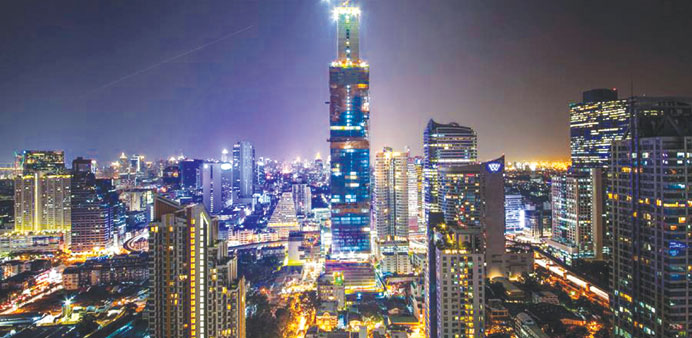Bangkok’s new luxury skyscraper Mahanakhon Tower, at 314 metres and 77 floors, will be the country’s tallest building when finished by the end of this year. PICTURE: Pace Development
By Arno Maierbrugger/Gulf Times Correspondent/Bangkok
Despite concerns about an oversupply of new condominiums and apartments in Thailand’s capital Bangkok which could put pressure on prices and increase vacancy rates, property experts are still confident that there is no real estate bubble on the horizon, at most “a more competitive market” for the big developers, as the Thai branch of global property consultancy CB Richard Ellis (CBRE) puts it.
Currently, there are more than 152,000 condominium units in various stages of development in the city, with an expected 80,000 units coming on the market in 2015 alone. But CBRE says that “continued demand will ensure that opportunities exist for the canny investor” as it sees “the return of foreign investors, drawn by the more stable political situation and lack of opportunity in their own markets.” According to CBRE, property investors in Bangkok can currently expect an average yield of around 5.3%, with the highest gross yields achieved in the lower Sukhumvit area for one-bedroom units.
There is also stable domestic demand for upmarket condos from Bangkok’s growing middle class population and slightly rising demand for expatriate apartments, which is also cushioning fears of an oversupply.
For long-time Bangkok residents, the speed of the construction of new units in central business areas is indeed amazing. Over the past four years, new high-end condo buildings have been mushrooming along the city’s popular Sukhumvit thoroughfare and in other popular areas such as Silom, Sathorn and Lumpini, and there is no end in sight. Asking prices for off-plan units in the high-end segment have been constantly up since 2012 when prices were around 140,000 baht ($4,375) per square meter, and have reached 180,000 baht ($5,625) per square meter by 2014. New luxury developments at prime locations have already crossed the threshold of 200,000 baht ($6,250) per square meter for the first time, which is higher than prices for comparable developments in Kuala Lumpur, Jakarta and Manila, for example, but still just around a third of the asking prices for such units in Singapore.
CBRE says the outlook remains especially bright for Bangkok’s super-luxury projects. Last year, units at five super-luxury properties achieved record-breaking prices of up to 300,000 baht ($9,375) per square meter, including The Ritz-Carlton Residences Bangkok in the Mahanakhon Tower, which is currently under construction and will be the country’s tallest building when finished as planned at the end of 2015. The tower will feature a hotel, retail space and condominiums, and the 194 units of The Ritz-Carlton Residences in the building are priced between $1mn and $11mn each, putting them among the most expensive condominiums in Bangkok. The entire project is expected to be valued at $640mn at completion, and interest has been strong also in the Middle East after a Dubai-based business group invested $27mn in off-plan condominiums in the tower two years ago.
However, challenges are seen in the midtown and suburban markets in Bangkok are, says CBRE, where more than 100,000 units are due for completion over the next 18 months alone in areas less interesting for foreign investors and mainly catering to Thais.
Due to political instability and the subsequent economic slowdown, purchasing power and creditworthiness especially of lower-earning Thais have been negatively affected, while at the same time consumer debt shot up to become the second-highest in the Association of Southeast Asian Nations (Asean) at 83% of gross domestic product, with only Malaysia having a higher ratio.
Many banks in Thailand have thus tightened their loan approvals, and some developers have voiced concerns whether their customers will be able to pay the final instalments of off-plan property they signed up in the past years after completion and handover. This means that much will depend on Thailand’s economic recovery as the overall housing market would probably not sustain an extended period of political shakiness and would certainly not be able to rely fully on foreign investors. This remains the main risk element when investing in the Thai property market.

